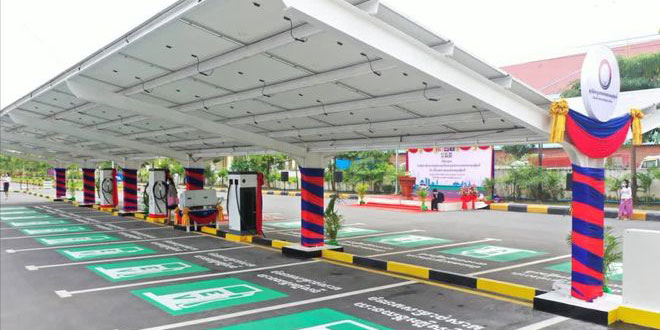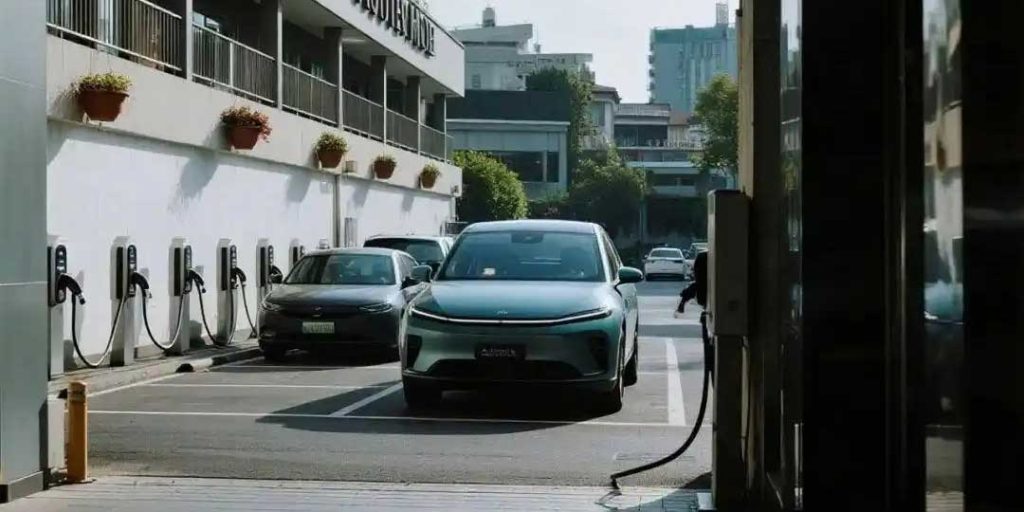What are the electric vehicle charging costs in Cambodia? Is driving an electric vehicle more cost-effective? How much can be saved annually? These questions trouble increasing numbers of Cambodians amid the unstoppable global trend toward vehicle electrification. Following recent news about Cambodia’s Electricité du Cambodge (EDC) unifying EV charging service pricing standards for the first time, more people are raising these queries. Below we provide detailed answers.
What are the electric vehicle charging costs in Cambodia?
On July 8, 2025, an announcement from Cambodia’s Electricité du Cambodge (EDC) sparked nationwide discussion among EV owners – the country unified EV charging service pricing standards for the first time.

According to the notice, all licensed charging stations must implement the following maximum prices:
- AC charging: 1,050 riel/kWh (≈$0.26)
- DC fast charging: 1,350 riel/kWh (≈$0.34)
This represents a 35% reduction from the 1,600 riel/kWh ($0.40) initially set by the Ministry of Public Works and Transport in August 2023. The Cambodian government is answering a core question with concrete action: Is driving an EV truly cheaper than a fuel-powered vehicle?
History of Cambodia’s EV Charging Cost Evolution
Before unified pricing standards, Cambodia’s EV charging market underwent significant policy adjustments. On August 1, 2023, the Ministry of Public Works and Transport first established charging service pricing at 1,600 riel/kWh (≈$0.40).
The ministry stated this pricing policy aimed to achieve “sustainability, efficiency, and accountability in charging services.”
This pricing saw a major shift in July 2025. EDC’s announcement not only differentiated between AC slow charging and DC fast charging but also reduced prices to $0.26 and $0.34 respectively.
The new policy explicitly states this is a national price ceiling, and operators may set lower prices, creating space for market competition.
Revealing 100km Costs for Cambodian EVs
According to 2025 data from Cambodia’s Ministry of Public Works and Transport, EV energy consumption for 100km is approximately 9-15 kWh (varies by model and driving conditions). Calculated at new electricity rates:
- AC charging cost: 15kWh × $0.26 = $3.90/100km
- DC fast charging cost: 15kWh × $0.34 = $5.10/100km
In practice, most owners primarily use overnight AC slow charging, meaning actual 100km costs typically don’t exceed $4.
Compared to traditional fuel vehicles, Cambodia’s average gasoline vehicle fuel cost is approximately $10/100km (2022 ministry data), while 2025 data shows gasoline vehicles now cost $8.69/100km.
This means EVs save $4.70–6.70/100km in fuel costs alone.
Cambodian EV Incentive Policies
Cambodia’s support for EVs extends beyond charging prices through comprehensive policies:
Unprecedented tax incentives
- Import tax reduction: In 2021, Cambodia reduced special tax for household pure EVs from 30% to 10% (20% reduction)
- Vehicle tax benefits: Starting 2025, EV road tax averages 20–30% lower than fuel vehicles
Explosive registration growth
Driven by policies, Cambodia’s EV market shows explosive growth:
- 2023 registrations: 313 units
- 2024 registrations: 2,253 units (620% annual growth)
- Most popular brands: China’s BYD, Japan’s Toyota, America’s Tesla
Current Status and Challenges of Cambodian EV Infrastructure
Despite rapid growth, Cambodia’s EV charging infrastructure remains nascent:
- National charging stations: 21 (2025 data)
- Primary distribution: Gas stations in major cities (Phnom Penh, Sihanoukville, Battambang, Siem Reap)
- Charging types: Simultaneous AC slow charging and DC fast charging services
Insufficient charging network coverage remains a major constraint. The ministry is accelerating charging pile deployment nationwide to address “range anxiety.”

Long-term Cost Considerations for Cambodian EVs
Despite clear usage cost advantages, consumers must consider long-term ownership costs:
Battery replacement costs
- EV battery lifespan: Typically 8–10 years or 150,000–200,000 km
- Replacement costs may reach thousands of dollars
- Cambodia’s hot climate may accelerate battery degradation
Maintenance comparison
- EVs: Simpler maintenance (no oil/air filter changes)
- Fuel vehicles: More routine items but wider service networks
Residual value concerns
- Rapid EV tech iterations may accelerate depreciation of older models
- Cambodia’s used car market favors fuel vehicles more
Cambodian EV Owner’s Guide
For Cambodian consumers considering EV purchase:
Charging strategy optimization
- Prioritize nighttime slow charging: Lower costs + reduced battery wear
- Route planning: Utilize 21 national charging stations to avoid range anxiety
Vehicle selection advice
- Prioritize battery warranty: Choose brands offering long warranties (typically 8 years)
- Consider local service networks: BYD has established relatively complete Cambodian services
Cost calculation reminder
- Annual mileage <10,000km: Fuel vehicles may be more economical
- Annual mileage >20,000km: EV fuel savings become significant
How Much Can Cambodian EVs Save Annually?
Considering electricity, taxes, and maintenance, high-mileage Cambodian EV users do achieve greater savings. For 20,000km/year:
- Fuel vehicle cost: ≈$1,738
- EV cost: ≈$780 (primarily slow charging)
- Annual savings: ≈$958
With EDC’s new pricing policy and expanding charging networks, EVs’ operational cost advantages will grow further. Cambodia’s electric revolution truly begins when charging stations become as common as gas stations – and today, we stand at this turning point.
Cambodia’s government has clear goals: By 2030, EVs will comprise 40% of national vehicles. With more charging stations, improved pricing mechanisms, and extended tax incentives, this green mobility revolution is reshaping Cambodia’s transportation economy.



